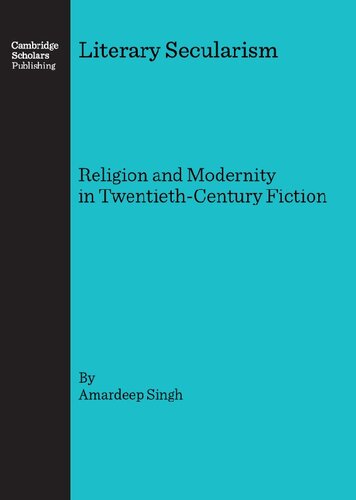Product desciption
Literary Secularism Religion And Modernity In Twentiethcentury Fiction Amardeep Singh by Amardeep Singh 9781847180490, 1847180493 instant download after payment.
Literary Secularism: Religion and Modernity in Twentieth-Century Fiction shows the path to secularization in the modern novel in comparative perspective. Writers as diverse as George Eliot, James Joyce, Salman Rushdie, Orhan Pamuk, Taslima Nasrin, and James Wood, have all struggled with religious orthodoxy in their personal lives, and are some of the most important and representative secular writers in the modern world canon. But their novels, which are far more than mere anti-religious manifestos, directly reflect the continued power of religious communities and institutions in the modern world. While religion is in a very real sense displaced from epistemological centrality in modernity, all of these writers suggest that religious texts, rituals, and communities have a force that is, in George Eliot's words, still throbbing in modern life. In a series of close readings, Literary Secularism argues that the intimate, often deeply ambivalent representation of religion is a key feature of modern writing and is central to the larger intellectual and historical project of modernity. Literary Secularism is then a complex literary ethos, which impinges as much on style, language, and novelistic form as on theme. The close readings here of novels such as George Eliot's Daniel Deronda, Rabindranath Tagore's Gora, James Joyce's Ulysses, and Salman Rushdie's The Satanic Verses all hinge on the ambiguity of religious and secular discourses. In some cases, the ambiguity is expressed through the affective and embodied experience of the protagonists, whose private subjectivity often conflicts with their public identities. The conflict between present and private is also explored in a dedicated chapter on secularism and feminism in India, as well as with regard to the global crisis of secularism that has emerged following the terrorist attacks of 9/11. While the particular experiences of the various narratives vary somewhat from author to author, all of the authors in this study are interested in defining a way of being secular that no sociological or ideological formula can fully describe. Correspondingly, while works of literature are certainly artifacts marking key moments in the history of secularisation, literature by itself doesn't produce secularism in either the cultural or the political context. In arguing for the literary as a historically-specific social and cultural mode of secularity, Literary Secularism offers a unique perspective on the problem of secularisation that may be of interest to fields such as literary criticism, religious studies, the sociology of religion, and polticial theory.


